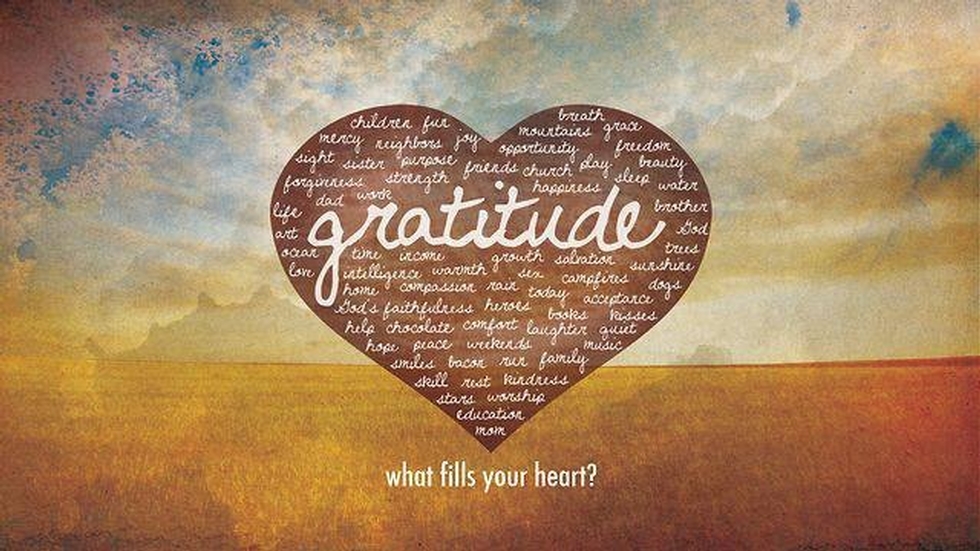This is part 2 of a 3 part series on gratitude and how you too can be creating an even more happy and fulfilling life if you begin cultivating gratitude daily.
- Part 1: Daily Gratitude and Why Stack Gratitude
- Part 2: [You are here] How Daily Gratitude Practice Works So Well
- Part 3: Seven Simple Ways To Experience More Gratitude
- Bonus Part: You'll have to read through all 3 parts first before you can get to that. You'll thank me!
If you're following the gratitude series, in the previous post, Part 1, I wrote about Daily Gratitude and Why You Should Stack Gratitude. If you haven't read that yet, go read that first because then this part will make more sense.
In this piece, you'll learn why the practice of gratitude works so well and how to make it work really well for you.
According to Dr. Robert Emmons, there are 2 components that make up the greater whole of gratitude. By understanding what these two components are you will understand why the practice of gratitude is very powerful yet simple.
Gratitude is an Affirmation of Goodness
The first part that makes it a really valuable practice is, gratitude is an affirmation of goodness. Just the thought or experience of gratitude immediately presupposes our recognition and affirmation (or ownership if you wish) that there are good things in the world around us or that we've received.
That's not to say life is perfect and completely fine because in fact, life may still consist of burdens, challenges, annoyances or what ever else.
The practice of gratitude does not remove any of those hardships.
But what the practice of gratitude DOES do is it changes your focus greatly. It changes how you are perceiving things. It causes you to look at that same world you were looking at through a different lens – the lens that shows you what is or what could be great about any given “challenging” situation.
The Source of Goodness
The second part to gratitude equation has to do with where that goodness is originating from.
You get a more powerful transformative effect from gratitude when the source of goodness is outside of you.
If we recognize the source of goodness as being external (coming from outside of ourselves), there is somewhat a greater appreciation of that goodness because it would have either come from other people, or perhaps even from a higher power. There's a greater appreciation and experience of gratitude in those cases because we remove ourselves from the equation, we feel humbled or “take care of” by the fact that there's something else or someone else that has our greater good in mind.
Does that make sense?
But that's not to say that you can't be grateful and appreciative of your own personal traits, actions or things you did , and not experience the same benefits from gratitude. You still can. But that feeling or recognition of “I did this” has to be linked to or originate from something else beyond you.
What do I mean by this? Let me give you an example which would make it easier.
Let's say today I write in my daily gratitude journal “I'm so grateful that I woke up early in the morning and did my yoga practice”.
Now let's compare that to, “I'm so grateful I woke up early this morning and experienced an amazing yoga session that was so fulfilling”.
What's the difference? Do you see? Just by reading those two statements, can you sense or feel the difference? Your mind's eye does create two completely different pictures doesn't it?
The first statement carries with it the meaning that I was completely responsible and in control of myself and my environment this morning and therefore I did it. It's all about me.
The second statement still does acknowledge and presuppose that I obviously had a big part to play in it because I did have to wake up early and it was me that had to get on the mat and begin the practice.
But, by simply saying “I experienced”, it kind of automatically means I gave up that in the process and allowed myself to be more present, to be led, to accept what is.
Is a large part of this about the language you use? Yes.
But more importantly, the reason language is so important is because language creates meaning.
Meaning has a huge part to play in how we feel about any experience we have. There's also a post you can read called the Power of Language and Meaning to understand more about this.
Now that you understand why practicing gratitude works so well and how to make it work best for you, all you need to do is begin using it yourself right? When would now be a great time to begin doing that? 🙂
You already know from the part 1 that you can keep a daily gratitude journal.
In part 3 of the gratitude series, I'll talk more about the gratitude journal and give you more valuable ideas of how else you can be more grateful, build your gratitude muscle and begin experiencing more gratitude every day.
So go ahead and ready part 3 now called 5 Simple Ways To Experience More Gratitude.
